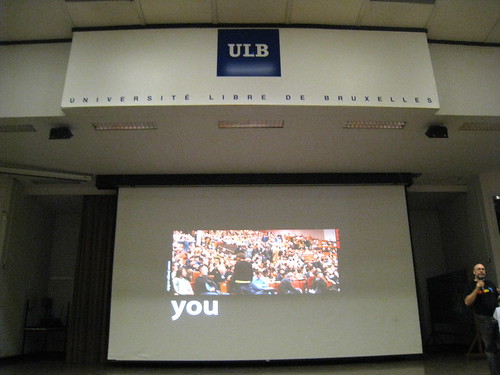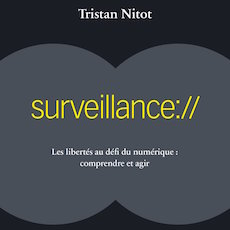Mark Surman, doing his keynote at Fosdem '09
Mark Surman gave a keynote at Fosdem. His slides are now available, and he has just published an article on this very topic: The future of open: what’s on your map?.
In his conclusion, Mark tried to answer the question "what do we need for the future to remain open?". Here are his 3 suggestions:
- Strong values, freedom beyond just code
- Great free software, that people love to use
- Users as hackers, anyone can bend anything
Let's review them.
1 - Strong values, freedom beyond just code
The 4 freedoms (study / copy / modify / share) have made FLOSS very successful, but now that Cloud computing is getting popular, we need more than just the 4 freedoms. Mark has mentioned the Franklin Street statement, which is a step in the right direction.
2 - Great free software, that people love to use
FLOSS will keep succeeding if it's capable of innovating and not doing just the same thing as its proprietary counterpart. It must be better (or just stay better) with also a better user experience. I guess that this notion of "software that people love to use" is a way to underline the importance of market share, needed in order to reach critical mass and shape the market.
3 - Users as hackers, anyone can bend anything
This is – in my opinion – what's the most interesting and easy thing to do.
Mark gave a few examples about enabling users to hack, in the most general sense. The openness of the code is enabling hacking, of course. But the idea is to take this further and open it to a new bigger crowd: the users.
- Contributing to Wikipedia
- Remixing videos, reusing pictures under CC license, for example
- Installing a plug-in in Wordpress or a Firefox extension.
This notion of a hackable world is central in my opinion, and one of the very reasons I'm in love with the Open Web: instead of being limited to consuming content (information and/or applications), the users can enjoy the content the way they want. The first examples of a hackable Open Web that come to my mind are:
- Accessibility. Not everyone can use a mouse. Not everyone can read small fonts. Not everyone can read quickly a ticker. Not everyone can distinguish every color. This is where accessibility is key (and where proprietary technologies often limit the user experience).
- Server-side mashups, the issue is that users rarely operate servers... However we're lucky to have several options on the client-side:
- GreaseMonkey. How a script can change the page I'm seeing on the fly. This gives me control over the application even if I can't control the server side of things.
- Various Add-ons such as CustomizeGoogle that enable me to add features to specific sites with a couple of clicks
- Ubiquity, an amazing (extensible) extension that enables client-side mashups.
I'm working with many people inside and outside the Mozilla community to demonstrate this in the upcoming MozCamp Utrecht early March, hoping to see similar events being hold in other countries in a near future.







6 réactions
1 De Edouard Klein - 11/02/2009, 20:03
Au-delà du logiciel, j'aimerais voir le principe de l'utilisateur/bidouilleur adapté au "hardware" : Il existe à mon avis beaucoup de gens capable de modifier leur voiture, machine à laver etc. Mais la documentation est inexistante et les ustentiles ne sont pas prévus pour.
Cela réduirait la nuisance induite par les services de réparation hors de prix qui changent toute une pièce pour un condensateur grillé, permettrait sans doute l'émergence de nouvelles idées et surtout ralongerait la durée de vie des produits dont la qualité a fortement baissé ces 20 dernières années dans le but de nous faire acheter encore et encore.
Je pense que rassembler des communautés autour de produits matériels aux plans sous Creative commons ou GFDL est possible et serait bénéfique aux clients et de fait aux entrepreneurs.
2 De Arnaud - 12/02/2009, 10:33
Malheureusement j'ai l'impression que ne prend pas du tout ce chemin... (dans tous les domaines de notre vie)
Regardez les voitures étaient modifiables pour toute personne ayant ce que j'appele "l'intelligence manuelle" -vous savez ces personnes capables de réparer une vieille R5 comme une plomberie bouchée, que l'on trouvait dans tous les petits villages- ...
Aujourd'hui même en allant dans un garage non agréé avec une voiture neuve, on a pas mal de chance de se retrouver face à un problème electronique qui nécessitera l'intervention de la "Boîte magique".
Tous les fournisseurs tentent de nous enfermer dans leur modèle, et malheureusement y arrivent
3 De Cédric - 12/02/2009, 13:31
> Tous les fournisseurs tentent de nous enfermer dans leur modèle, et malheureusement y arrivent
Je crois que c'est justement le point de ce billet : rendons le monde bricolable, modifiable, adaptable. Au delà du logiciel, l'exemple des appareils ménagers et des voitures démontre parfaitement le problème.
4 De Tristan - 12/02/2009, 14:18
@Cédric : excellente réponse faite à Arnaud. Le monde est le résultat de ce que nous faisons. Assurons nous que le monde que nous construisons est "hackable"...
5 De Jane Finette - 12/02/2009, 15:09
Thanks and a great post Tristan.
To your comment: "Remixing videos, reusing pictures under CC license, for example" - I just read the new Laurence Lessig book "Remix" and would urge anyone who is interested in remixing and copyright to read it. Its clear that if we are going to encourage and embrace a hackable world where 'anyone can bend anything' - we are also going to need to address the question of ownership at a legal-level.
6 De Steph - 12/02/2009, 23:26
Il reste des produits hackables, exemple ma tuture pas chère d'origine roumaine.
La première fois que mon garagiste préféré (et pas cher !) l'a vue arriver, il souriait de toutes ses dents, et m'expliquait que c'est le genre de caisse qu'on faisait il y a 20 ans, quand les mécanos des grandes concessions ne travaillaient pas avec ordinateur portable et gants blancs, mais savaient encore redresser la tôle et remplacer une pièce cassée avec un bout de ferraille.